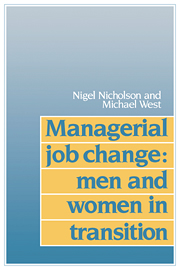Book contents
- Frontmatter
- Contents
- List of tables
- List of figures
- Acknowledgements
- 1 Men and women in transition
- 2 A managerial profile
- 3 All change: mobility patterns in management
- 4 The causes of mobility
- 5 Experiencing the Transition Cycle
- 6 Outcomes of job change
- 7 The cutting edge of change – the case of newly created jobs
- 8 Organizational career development – the management experience
- 9 Women in management
- 10 Managerial job change – theory and practice
- Appendix
- Notes
- Bibliography
- Index
3 - All change: mobility patterns in management
Published online by Cambridge University Press: 19 October 2009
- Frontmatter
- Contents
- List of tables
- List of figures
- Acknowledgements
- 1 Men and women in transition
- 2 A managerial profile
- 3 All change: mobility patterns in management
- 4 The causes of mobility
- 5 Experiencing the Transition Cycle
- 6 Outcomes of job change
- 7 The cutting edge of change – the case of newly created jobs
- 8 Organizational career development – the management experience
- 9 Women in management
- 10 Managerial job change – theory and practice
- Appendix
- Notes
- Bibliography
- Index
Summary
The portrait of the managerial character painted in Chapter 2 has positive and reassuring overtones. Managers care more about their families than their jobs, and more about their higher order needs than their material satisfactions, though it might be said, without being unduly cynical, that most can afford to take this stance from a position of well-paid employment. At the same time there is considerable variation in managers' expressed needs and how likely these are to be fulfilled by the positions they are in. Although we found no evidence of widespread and deeply felt frustrations, there were a number of discordant notes in some of our findings. Psychological adjustment at work is less favourable than away from work. Managers often find organizations fail to fulfil their needs for achievement, recognition and feedback, and they are also often disappointed in their senior managers. Therefore, it would not be surprising if managers sought out job change as a way of removing frustrations and improving the quality of their work lives. One major aim of our study was to find out if managers do try to do this, and if they are successful in the attempt.
We also pointed out in Chapter 1 that job change is likely to be driven by more than just the needs and desires of managers.
- Type
- Chapter
- Information
- Managerial Job ChangeMen and Women in Transition, pp. 45 - 71Publisher: Cambridge University PressPrint publication year: 1988



